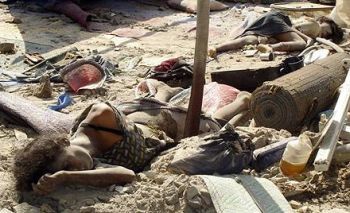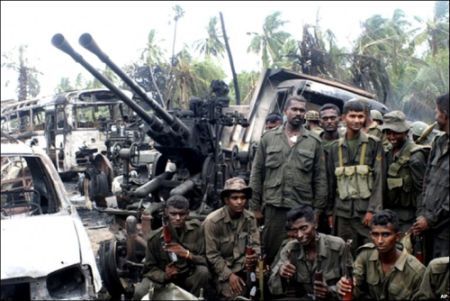
Publisher:
Bonnie King
CONTACT:
Newsroom@Salem-news.com
Advertising:
Adsales@Salem-news.com

~Truth~
~Justice~
~Peace~
TJP
May-13-2012 17:54


 TweetFollow @OregonNews
TweetFollow @OregonNews
Mullivaikaal - The Time For Mourning Is Over
Karthick RM Special to Salem-News.comWhat happened three years back at this place called Mullivaikaal?
 This was the end for these victims in Mullivaikal photo: srilankaguardian.org |
(LONDON Countercurrents) - Some called it a climax of a long story. It is a turning point. Some called it a full-stop. It is a comma. Many call it a tragedy. Of Epic proportions in the history of the Tamils.
Tragedies are often best expressed in verse. I found the best description of what happened in Mullivaikaal in the verses of Pablo Neruda.
“Here they brought rifles
loaded
with gunpowder, they ordered bitter extermination:
here they found the people singing,
a people united by duty and love,
and the slender child fell with her flag,
and the smiling young man rolled wounded beside her,
and the people’s stupor saw the dead fall
with fury and with grief.
Then, on the site
where the assassinated fell,
they lowered the flags to bathe them in blood,
to raise them again in the assassins’ presence.”
(Canto General)
 BBC photo of 'victorious' SLA troops in Mullivaikal after the slaughter |
In defiance of the assassins in Colombo, and those who armed them, the Tamil Eelam standard still flies wherever there are Tamils in the world, remembering Mullivaikaal. Adorno had said that poetry after Auschwitz is barbaric. In a somewhat similar vein, a Tamil scholar told me that Mullivaikaal rendered the veneration of Tamil classics pointless. He argued that ‘puram’ poetry, that aspect of Tamil poetry that deals with themes pertaining to war, heroism, sacrifice, military code etc. was outdone in Vanni, and that the depiction of the same in Tamil classics were but dust in front of those Tamils who stood their ground against insurmountable odds in Eelam War IV. Rather than the classics setting standards to gauge Tamil values, the martyrs of Mullivaikaal set a standard to gauge classics, he contended. I could not disagree.
In Mullivaikaal, we witnessed the zenith of Tamil civilization. We witnessed an unimaginable heroism of the fighters for Tamil sovereignty and the people who nurtured them, the people for whom they acted as human shields against a genocidal army. We saw them enduring starvation, thirst, disease, Kfirs, shells, claymores, cluster bombs, chemical weapons. We saw people whom we called amma, anna, thambi, machaan, appa, akka getting killed, tortured, raped and crippled by the tens of thousands. We saw families evaporating, widows becoming staggering statistics, and numbers replacing persons. In ways more than one, we were left orphans.
Award winning film-maker Beate Arnesatd’s latest documentary “Silenced voices” has a clipping of a child wailing before the corpse of her mother, a scene that left many Tamils in tears, both during its screening in Oslo and at a closed-door show in London. The child cries (quoting from memory. The actual sentences are more or less the same.) “You have left us as orphans... now who will take care of us? Our real suffering is going to begin now.” A friend who also saw the documentary gave me an interpretation of this moving sequence - the little girl’s words reflected not just her personal loss, but also a portrayal of the state of the Tamil nation after our de facto state was crushed with the aid of the world powers, with the Sinhalese acting as executioners. The protracted genocide that is still unfolding in Tamil Eelam occupied by the Sinhala state is open for the world to see. If it would see, that is.
Likewise, we also saw the nadir of Sri Lankan barbarism in Mullivaikaal. We are witness to what the Sinhalese were willing to do to ensure the permanent victory of their state. We see how they trample upon everything that we cherish as a nation, our identity, our language, our culture, our family, our land and above all, the memory of those who loved us so much that they fell so that we may stand. And we also bear the brunt of the brutal jokes that they throw to us, calling rape as reconciliation, plunder as peace, and death as development. As we are compelled to hand control of our lands, bodies and minds to their coercive power, we see them celebrating their festivals in our cultural capital with a conqueror’s mentality, replacing the names of our towns with their language, settling their people in our lands, and forcing us to be things that we never can be without being permanently mutilated. To paraphrase Sartre from his stunning preface to ‘The Wretched of the Earth’, we know our oppressors by our wounds and shackles; that is what makes our testimony irrefutable - we only need to know what they have done to us for them to realize what they have done to themselves.
New Song 'Depression' - Graphic Truth of Sri Lanka Tamil Genocide |
But the priority is clear. The onus is on us. We are not facing any form oppression – we are facing THE form of oppression. Genocide. If we are going to be dreaming about a time when a genuine realization comes in the other side or in the world of how moral we were, by that time there would be no Tamil nation on our side to fight for. Gauging by the way things are proceeding in the Tamil homeland, in ten years the Tamils are bound to become a scattered minority, with no sense of territory or identity. The morality of our position alone will secure nothing. If morality decided affairs in politics, then the Native Americans, the aborigines, the indigenous tribes of Latin America should be having control of the lands they lost. As a good Tamil friend pointed out to me citing Bertrand Russell, war does not determine who is right, it determines who is left. Sri Lankan war on the Tamils continues and will continue till there are no Tamils as a nation left in the island.
We have mourned enough for Mullivaikaal. Mourning can unite people and give them a sense of identity in abstract. But for concrete identity politics, there is no substitute for using the moment to convey a consensus of a political position. So let the occasion not just be a time to shed tears for those butchered, but also a time when we try to live up to the standards of those who fought till the end for what they believed in, for what is our right. Let the month of May be a time we undertake a ruthless analysis of where we stand and why, a cold assessment of who our friends are and who our enemies are, and frame a strategy that will deliver the primary political goal of Tamil Eelam. While symbolism is important, let us realize that in politics, symbols are meaningless unless they are used to take a people to material political goals, and that symbols themselves should be interpreted in a way that they conform to the primary political objective.
For instance, the Tamil youth in Canada have decided to call the occasion as ‘Tamil Uprising Day’. That probably is the closest tribute to the spirit of those Tamil women and men who went down standing in May 2009.
The author is a research scholar at the University of Essex, UK
Special thanks to Countercurrents.org
http://www.countercurrents.org/karthick120512.htm
 |
 |
 |
 |
 |
 |
 |
Articles for May 12, 2012 | Articles for May 13, 2012 | Articles for May 14, 2012



Quick Links
DINING
Willamette UniversityGoudy Commons Cafe
Dine on the Queen
Willamette Queen Sternwheeler
MUST SEE SALEM
Oregon Capitol ToursCapitol History Gateway
Willamette River Ride
Willamette Queen Sternwheeler
Historic Home Tours:
Deepwood Museum
The Bush House
Gaiety Hollow Garden
AUCTIONS - APPRAISALS
Auction Masters & AppraisalsCONSTRUCTION SERVICES
Roofing and ContractingSheridan, Ore.
ONLINE SHOPPING
Special Occasion DressesAdvertise with Salem-News
Contact:AdSales@Salem-News.com

Terms of Service | Privacy Policy
All comments and messages are approved by people and self promotional links or unacceptable comments are denied.
Johnson May 13, 2012 8:13 pm (Pacific time)
Tim,
After reading more about your articles on Sri Lanka, and reflecting back on the Holocaust of the Jews, I hope we humans learn from these.
Thank you.
Tim King: Thanks so much!
[Return to Top]©2025 Salem-News.com. All opinions expressed in this article are those of the author and do not necessarily reflect those of Salem-News.com.